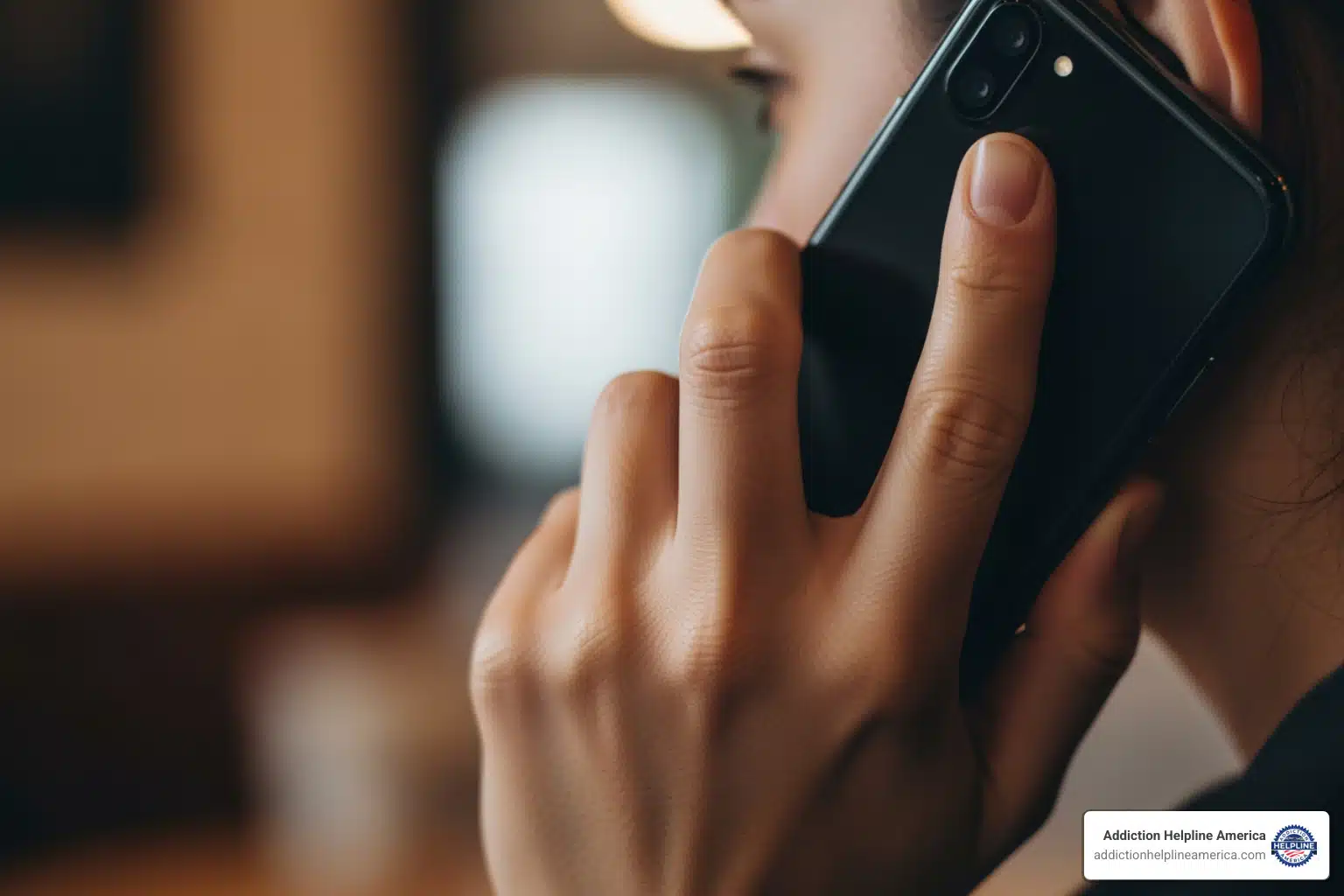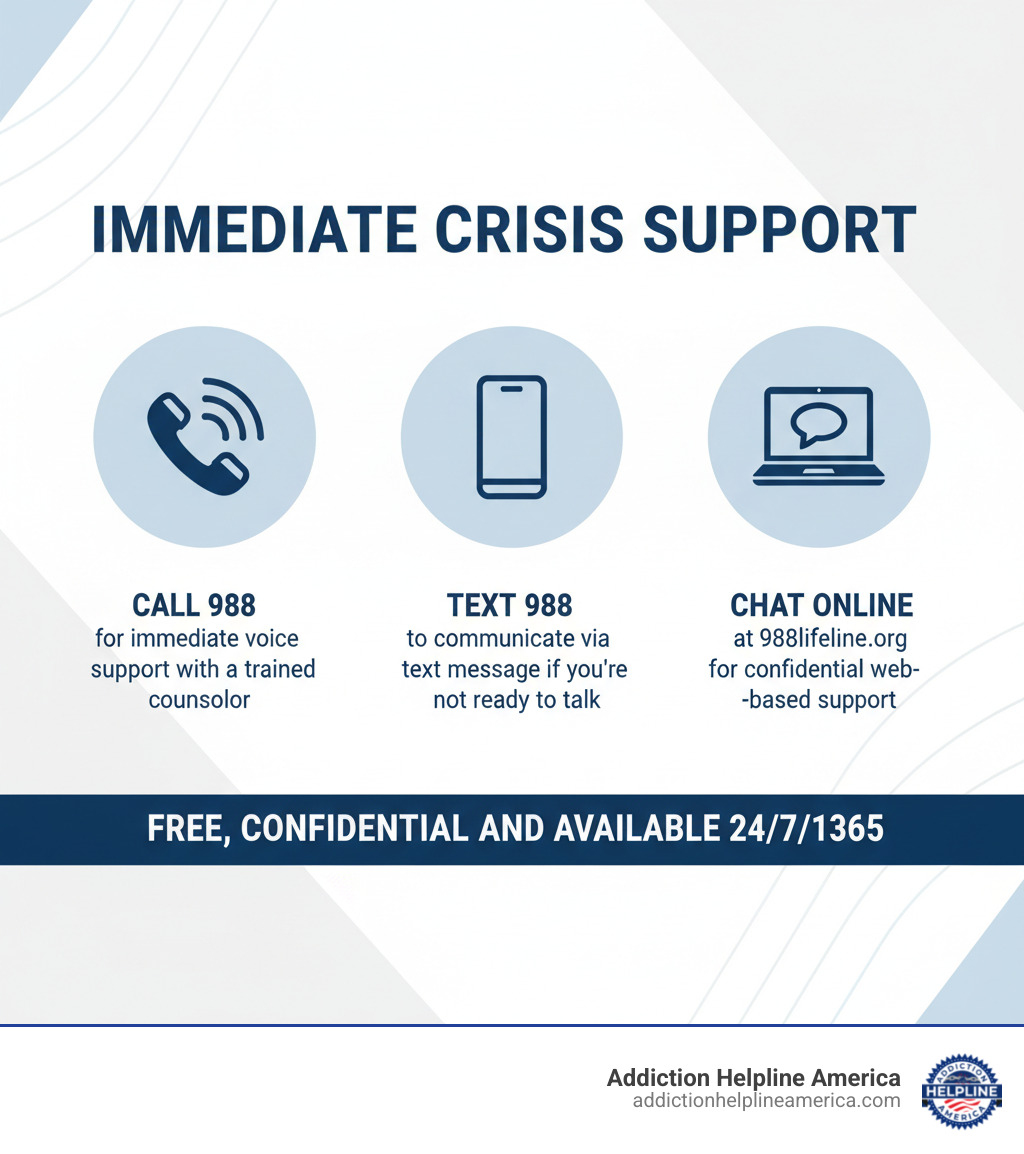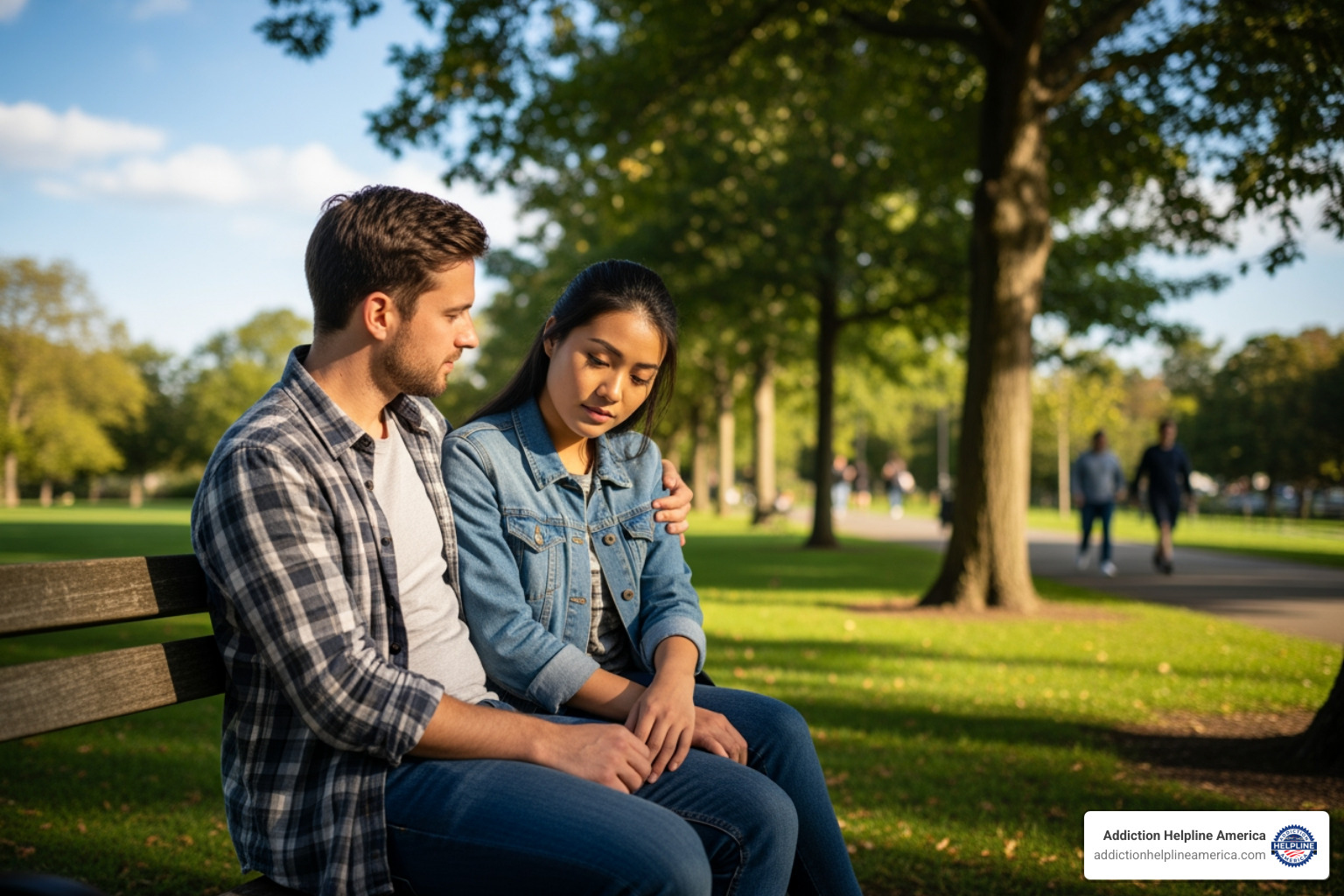
You Are Not Alone, Help is a Call Away
If you’re searching for a suicide hotline, you need immediate support—and it’s available right now, 24 hours a day, 7 days a week. Here’s how to get help instantly:
Immediate Crisis Support:
- Call 988 – The 988 Suicide & Crisis Lifeline connects you to trained counselors
- Text 988 – If you prefer texting, support is available this way too
- Chat online – Visit 988lifeline.org to chat with a counselor
- Call 911 – If you or someone else is in immediate danger
What to Expect:
- Free and confidential support
- Available 24/7/365
- Trained, judgment-free counselors
- Support for any level of distress—not just active suicidal thoughts
- Help for yourself or guidance on supporting a loved one
Suicide hotlines provide immediate, compassionate support to anyone experiencing emotional distress, suicidal thoughts, or a mental health crisis. You don’t need to be in immediate danger to reach out. Crisis lifelines are also there if you’re struggling with substance use, feeling overwhelmed, or simply need someone to talk to without judgment.
The 988 Suicide & Crisis Lifeline connects everyone in the United States to a network of local crisis centers. These professionals are trained to listen, provide support, and connect you with resources, all while maintaining your confidentiality. Support is also available in Spanish and through specialized services for communities including veterans and LGBTQ+ youth.
Reaching out is a sign of strength. Millions of people contact crisis hotlines every year, and a single conversation can be a turning point. At Addiction Helpline America, we understand the deep connection between mental health and substance use. We are committed to connecting individuals with comprehensive crisis support and long-term treatment resources through our nationwide suicide hotline and addiction support services.

Understanding Suicide Hotlines and Crisis Lifelines
A suicide hotline is a free, confidential service that connects you with trained counselors ready to listen and support you. In the United States, the 988 Suicide & Crisis Lifeline is the national network providing this support 24/7/365. When you reach out, you’re connected to a local crisis center with skilled, judgment-free counselors.
All conversations are confidential and free. You don’t need insurance or to provide your name. The focus is entirely on getting you the support you need. The 988 Lifeline is not just for people in immediate crisis. It’s for anyone experiencing suicidal thoughts, struggling with substance use, feeling overwhelmed, or simply needing to talk. For more information, visit our resource page: What is a suicide hotline?
How do suicide hotlines work?
Getting help through the 988 Lifeline is simple. You can choose the method that feels most comfortable:
- Call 988 from any phone to be connected to the network of local crisis centers.
- Text 988 for a discreet way to get support if you’re unable or unwilling to talk.
- Chat online at 988lifeline.org/chat for support through your web browser. Spanish speakers can visit linea988.org/chat.
When you reach out, you are quickly routed to a nearby crisis center based on your area code. The 988 Lifeline also offers specialized support. Veterans can press 1 after calling 988 to connect to the Veterans Crisis Line. Spanish-speaking individuals can text “AYUDA” to 988. The service is also accessible for Deaf and Hard of Hearing individuals.
Call Now – Your Journey to Recovery Begins Today!

Take the first step towards a healthier life! Call now to connect with our compassionate team and start your recovery journey today. Your path to healing awaits!
Our recovery specialists are available 24/7 to provide support, and all calls are confidential and free. Reach out anytime – we’re here to help!
What to expect when you contact a suicide hotline
Reaching out can feel intimidating, but knowing the process helps. When you call, you’ll hear a brief automated greeting with menu options (e.g., press 1 for the Veterans Crisis Line). You may hear music while your call is routed to the nearest available crisis center.
A trained crisis counselor will then answer. Their job is to listen without judgment, understand what you’re going through, and help you explore your options. The conversation is focused on you. The counselor can help you identify coping strategies, discuss local resources, or simply be a calm, caring presence. All conversations are free and confidential. Most people get the help they need through conversation alone, without any emergency intervention.

Who can use a suicide hotline?
The 988 Lifeline is for everyone. You don’t need to be in active crisis or experiencing suicidal thoughts to call. If you’re struggling, that’s reason enough. People reach out for many reasons:
- Feeling overwhelmed, sad, or anxious
- Experiencing suicidal thoughts
- Worries about substance use
- Dealing with depression, PTSD, or other mental health concerns
- Loneliness or isolation
- Concern for a friend or loved one
Your age or reason for calling doesn’t matter. Call, text, or chat with the 988 Suicide and Crisis Lifeline for free, confidential support—anytime, for any reason. At Addiction Helpline America, we connect people with both immediate crisis support and long-term treatment resources that address co-occurring mental health and addiction challenges.
Recognizing the Need for Help and How to Offer Support
Knowing when to seek help or how to support someone can be difficult. Talking openly about suicide does not increase risk; in fact, asking someone directly if they’re thinking about suicide can be the lifeline they need. Learning to spot warning signs in yourself and others is a powerful tool in suicide prevention. If you’re ever uncertain, contacting a suicide hotline like 988 is always the right choice.

Warning signs of suicidal thoughts or severe distress
Changes in behavior and language can be calls for help. If you recognize these signs in yourself or someone else, it’s time to reach out.
- Talk: Talking about wanting to die, having no reason to live, being a burden to others, feeling trapped, or being in unbearable pain.
- Behavior: Increased use of alcohol or drugs, looking for a way to end their life, withdrawing from activities, isolating from family and friends, sleeping too much or too little, visiting or calling people to say goodbye, giving away prized possessions, aggression, or fatigue.
- Mood: Depression, anxiety, loss of interest, irritability, humiliation, shame, agitation, or a sudden sense of relief or calmness.
If these signs resonate with you, please know you deserve support. For more information, visit our resource on What are suicidal thoughts?
How to support a friend or loved one
If someone you care about is in crisis, your support can make all the difference.
- Ask directly: Asking “Are you thinking about suicide?” gives them permission to be honest. It does not plant the idea.
- Listen without judgment: Create a safe space for them to share their feelings. Your job is to listen, not to fix.
- Take them seriously: Never dismiss their feelings. Their pain is real and deserves immediate attention.
- Encourage professional help: Suggest calling a suicide hotline like 988 or seeing a therapist. Offer to help them make the call.
- Stay with them: If they are in immediate crisis, do not leave them alone.
- Remove means of harm: If you can do so safely, remove access to firearms, medications, or other potential means of self-harm.
- Follow up: Check in regularly to show your continued support. Your presence matters.
For more guidance, see How to help a friend who may be feeling suicidal
Creating a personal safety plan
A personal safety plan is a roadmap you create to manage suicidal feelings during a crisis. It’s a personalized, step-by-step tool to help you steer distress.
Your plan should include:
- Your personal warning signs that a crisis may be approaching.
- Internal coping strategies that you can do on your own (e.g., breathing exercises, listening to music).
- People and social settings that can provide distraction.
- People you can ask for help, like trusted friends or family.
- Professional help contacts, including your therapist and the 988 Suicide & Crisis Lifeline.
- Making your environment safe by limiting access to lethal means.
Creating a safety plan is an act of self-compassion. Counselors at 988 can help you create one, or you can use online resources like Creating a ‘safety plan’.
When to Call a Suicide Hotline vs. 911
When you or a loved one is in crisis, knowing who to call is critical. Both the 988 Suicide & Crisis Lifeline and 911 are lifesaving resources, but they serve different purposes.
988 is for mental health support. Call or text 988 if you are having suicidal thoughts, experiencing a mental health or substance use crisis, or are in emotional distress but not in immediate physical danger. You will be connected with a trained crisis counselor whose goal is to provide compassionate support and de-escalation.
911 is for medical and safety emergencies. Call 911 if someone is actively attempting suicide, has already injured themselves, or if there is an immediate threat of violence to themselves or others. This will dispatch police, fire, or ambulance personnel to provide emergency medical care and ensure physical safety.
Call Now – Your Journey to Recovery Begins Today!

Take the first step towards a healthier life! Call now to connect with our compassionate team and start your recovery journey today. Your path to healing awaits!
Our recovery specialists are available 24/7 to provide support, and all calls are confidential and free. Reach out anytime – we’re here to help!
Understanding the difference ensures you get the most appropriate help. Here’s a clear comparison:
| Feature | Suicide Hotline (988) | 911 (Emergency Services) |
|---|---|---|
| When to Call: | Suicidal thoughts, mental health crisis, substance use issues, emotional distress, loneliness, general need for support, seeking advice on how to help a loved one. | Immediate danger, medical emergency (e.g., severe injury from self-harm), suicide attempt in progress (e.g., overdose, active self-inflicted wound), threat of violence to self or others, crime in progress. |
| Who Responds: | Trained crisis counselor (often a mental health professional or a trained volunteer). | Police, fire, or ambulance personnel. |
| Type of Response: | Listening, empathetic support, de-escalation techniques, safety planning, connection to local mental health resources, guidance on coping strategies, confidential conversation. | Emergency dispatch, securing the scene, medical transport, law enforcement intervention, physical safety measures. |
| Primary Goal: | Prevent suicide, de-escalate emotional distress, provide mental health support, connect individuals to ongoing care, maintain confidentiality. | Ensure immediate physical safety, provide emergency medical care, address criminal activity. |
| Confidentiality: | High degree of confidentiality, with limited exceptions for imminent danger to self or others. | Limited confidentiality due to the nature of emergency response and potential public records. |
If you’re ever unsure which to call, it’s always better to reach out for help than to wait. Your safety and well-being are what matter most.
Additional Helplines and Mental Health Support
The 988 Suicide & Crisis Lifeline is a vital resource, but it’s part of a larger network of support. Different people need different types of help, which is why specialized services and comprehensive care are so important.

Specialized services for specific communities
Connecting with someone who understands your specific experience can make a significant difference.
- Support for Veterans: Call 988 and press 1, text 838255, or chat online at veteranscrisisline.net. Connect with responders trained in military culture.
- Support for LGBTQ+ Youth: The Trevor Project offers specialized crisis support. Call 1-866-488-7386, text START to 678-678, or chat online at their website.
- Support for LGBTQ+ Adults: The LGBTQ+ National Hotline provides support and resources at 1-888-843-4564.
- Text and Chat Options: If you prefer not to talk, text HOME to 741741 to connect with the Crisis Text Line. Spanish speakers can text HOLA to 741741.
- Family and Friends Support: You can call any suicide hotline for advice on supporting a loved one. Al-Anon and Ala-teen (800-356-9996) specifically support those affected by a family member’s alcohol addiction.
Other resources for addiction and mental health
Mental health and substance use issues often overlap (co-occurring disorders) and require integrated support.
- SAMHSA National Helpline (1-800-662-4357): A 24/7 treatment referral and information service for mental health and substance use.
- NAMI Helpline (1-800-950-6264): Offers peer support and resources for people with mental health conditions and their families. Text “Helpline” to 62640.
- 211 Services: Dial 211 to connect with local resources for housing, food, financial assistance, and more.
- Boys Town National Hotline (1-800-448-3000): 24/7 crisis intervention and resources for youth and families.
- Drugfree.org (855-378-4373): Call or text 55753 for education and guidance on substance use.
At Addiction Helpline America, our mission is to connect individuals to addiction and mental health treatment centers nationwide. We provide free, confidential guidance to help you find the right program for co-occurring disorders, ensuring you receive integrated care for lasting recovery. For more information, visit our page: More info about addiction and rehab hotlines
Frequently Asked Questions about Suicide Hotlines
It’s natural to have questions before contacting a suicide hotline. Here are answers to some common concerns to help you feel more comfortable reaching out.
Is calling a suicide hotline completely confidential?
Yes, conversations with the 988 Suicide & Crisis Lifeline are free and confidential. This privacy creates a safe space for you to share openly. Crisis centers follow strict confidentiality standards, similar to other healthcare services.
However, in rare situations where a counselor believes you are in immediate, life-threatening danger and cannot keep yourself safe, they may involve emergency services to protect you. This is called an “active rescue” and is only used as a last resort when there is an imminent risk of harm. The vast majority of contacts are resolved through supportive conversation alone.
What if I’m not actively suicidal but need to talk?
You do not need to be suicidal to contact the 988 Lifeline. It is a resource for anyone experiencing any kind of emotional distress. Reaching out early is encouraged.
Whether you’re feeling overwhelmed by stress, loneliness, anxiety, or are worried about substance use, these are all valid reasons to call, text, or chat. A supportive conversation can often alleviate distress before it becomes a crisis. You deserve to be heard, no matter what you’re going through.
Can they trace my call or text?
The 988 Lifeline is designed for connection, not surveillance. When you contact 988, your area code is used to route you to a nearby crisis center for local support, but you are not required to provide your name or any other identifying information. You control what you share.
The focus is on providing support, not on tracking you. In the rare emergency where there is an active, life-threatening situation and your location is unknown, emergency services might be engaged to trace the contact to ensure your safety. This is a last-resort measure to save a life. The system is built to support you anonymously and confidentially.
Call Now – Your Journey to Recovery Begins Today!

Take the first step towards a healthier life! Call now to connect with our compassionate team and start your recovery journey today. Your path to healing awaits!
Our recovery specialists are available 24/7 to provide support, and all calls are confidential and free. Reach out anytime – we’re here to help!
Conclusion: Your Path to Support Starts with a Single Step
When the world feels too heavy, remember this: you are not alone. Reaching out for help is one of the strongest things you can do. Contacting a suicide hotline is a powerful choice to prioritize your well-being and open the door to healing.
The 988 Suicide & Crisis Lifeline is available right now to offer free, confidential support. If you’re experiencing suicidal thoughts, feeling overwhelmed, or simply need to talk, trained counselors are standing by 24/7. You can call 988, text 988, or chat online at 988lifeline.org.
Help is always available, and you deserve support. Your feelings are valid, and there are people who care about helping you through this. At Addiction Helpline America, we know that mental health and addiction are often intertwined. We are committed to connecting you with both immediate crisis support and comprehensive, long-term care.
Recovery is possible, and it often starts with a single conversation. Your story isn’t over. Take that step today.
Find comprehensive support with our addiction and rehab hotlines and let us help you find the personalized guidance that can lead to recovery and hope.
Our helpline is 100%
free & confidential
If you or someone you care about is struggling with drug or alcohol addiction, we can help you explore your recovery options. Don’t face this challenge alone—seek support from us.
Programs
Resources
Will my insurance
cover addiction
treatment?
We're ready to help
Find the best
drug or alcohol treatment
center
Are you or a loved one struggling with addiction? Call today to speak to a treatment expert.















